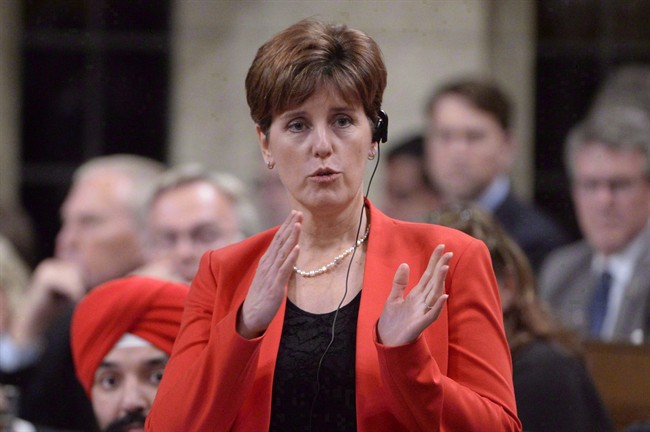OTTAWA – The international development minister says she wants to see what more can be done to help indigenous people who are affected by Canadian mining operations abroad.

Marie-Claude Bibeau says that is one potential change in Canada’s foreign aid policy as she embarks on a sweeping review of the country’s international development assistance.
Bibeau announced the terms of wide-ranging public consultations on revamping aid policy this week, as the Trudeau government faced international pressure to boost overall aid spending to meet a UN target.
READ MORE: Canada endorses United Nations Declaration on the Rights of Indigenous Peoples
Bibeau stressed the need to help women and girls — a “feminist approach,” she called it — as well as recognizing the need to help failing and fragile states and deal with the impact of climate change.
She also plans to take a closer look at so called public-private partnerships that have seen aid dollars spent in conjunction with resource companies.
The previous Conservative government pushed these partnerships over the protests of many non-governmental organizations, while some Canadian companies have periodically faced accusations of riding roughshod over the rights of local indigenous people in developing countries.
Natural resource exploitation is important for the economic growth of many developing countries, Bibeau explained in an interview Thursday.
But she said she plans to review the preliminary reports on the five pilot projects involving Canadian resource companies in aid partnerships.
“We have a role to play … let’s say to protect mining workers and to have these companies have the best positive impact in their communities.”
The Conservatives were also accused of linking Canada’s trade ambitions too closely with its aid policy.
Bibeau said helping the poorest of the poor — her mandate — is separate from that of her colleague, International Trade Minister Chrystia Freeland, which is to foster Canadian business and investment opportunities abroad. But Bibeau said those two interests are not mutually exclusive.
“There’s always more that can be done for vulnerable people, so I really look forward to working in partnership with minister Freeland because we have different objectives but we share the same concerns in terms of human rights.”
The review will examine the 25 countries of focus where the majority of Canada’s development spending is targeted.
READ MORE: How an old recessionary plan may be keeping Canada’s First Nations in ‘third world’ conditions
The decision to include countries such as Peru and Colombia, both of which have free trade deals with Canada, or Mongolia, where Canadian mining companies are heavily invested, has also been questioned by critics.
Without giving specifics, Bibeau said she expects some of those countries to change but added it’s too early to tell which.
Santiago Alba-Corral, the senior director of international development for CARE Canada, told a House of Commons committee earlier this week that the time had come for Canada to re-evaluate its countries of focus.
While the amalgamation of the now defunct Canadian International Development Agency with foreign affairs and trade under the new Global Affairs Canada banner might pay dividends, Alba-Corral warned of one possible risk.
“International development itself is undermined if it’s seen to support trade and diplomatic outcomes,” he told the Commons foreign affairs and development committee.
The government launched an on-line consultation this week that extends to the end of July.
Bibeau said she’s reaching out to civil society groups, and will leverage Canadian missions in developing countries to get on-the-ground input from local people.
She plans to deliver a five-year plan to cabinet later this year and she’s also consulting with Defence Minister Harjit Sajjan, who has also embarked on his own defence policy review.



Comments